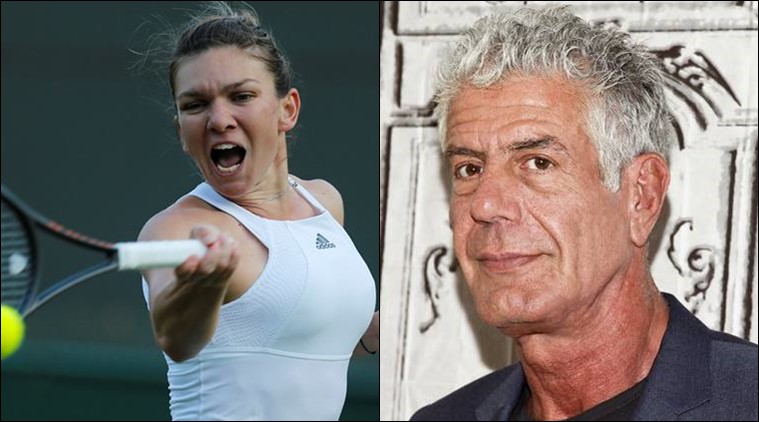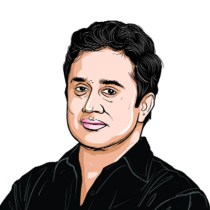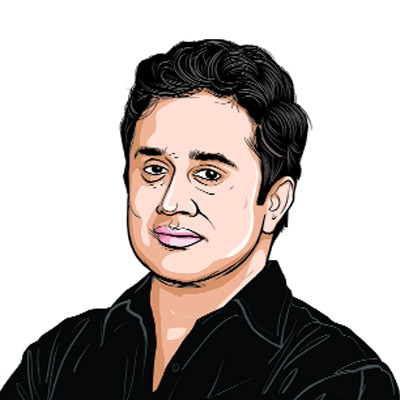All Our Inner Battles
Simona Halep, Anthony Bourdain exemplify the complexity of ‘mental strength’

Tennis Player Simona Halep and Chef Anthony Bourdain. (File Photos)
Last week, two role models from different parts of the world arrived at opposite ends of their journeys through life. In Paris, Simona Halep reached the pinnacle of her tennis career, after plumbing the depths of despair. Not far away, in the village of Kaysersberg in France, Anthony Bourdain took his own life after years spent living the dream — travelling the world, exploring food and culture with an endearing combination of brashness, empathy, curiosity, and verve.
Halep and Bourdain have come to exemplify the complex idea of what we often call “mental strength”. It is an idea worth investigating especially in India, where we tend to be blind to the everyday pressures that lead to one of the world’s highest suicide rates among young people under the age of 30.
Both Halep and Bourdain have been nothing if not searingly honest about their shortcomings in the mental strength department. Halep’s maiden Grand Slam triumph came after years of soul-searching and self-questioning — she lost three Grand Slam finals before finally breaking through last week. She’s not the first player to have lost in their first three or four Grand Slam finals. But Halep’s triumph did more than just exorcise the ghosts of Court Philippe Chatrier where she blew a seemingly insurmountable lead 12 months ago in the final against Jelena Ostapenko. She triumphed over her own history of negative and self-destructive thinking on court. Halep has long been forthright about how nervous she gets, and what a battle it is for her to overcome anxiety.
Bourdain spoke publicly about his struggles with drug addiction and depression as well as his inability to find happiness despite living a life defined by incredible good fortune. He spoke of spiralling quickly into near hysterical bouts of depression, of feeling isolated, and having trouble connecting with others. To the outside observer, it’s almost impossible to imagine someone more skilled at forming a rapport with strangers — so good was Bourdain at overcoming his inner demons while on the job, converting all that painful energy into the zany combination of empathy, swagger and kindness that came to define his wonderful style of story-telling.
We admire and respect the dominance of a Roger Federer or Serena Williams. We are riveted by the confidence and bravado of celebrity chefs on reality shows. But such dominance and relentless positivity is hard for most of us to replicate or relate to.
We are biologically and socially geared to recognise dominance, confidence and aggression as signs of strength and success, but the reality is that these qualities are the exception in most lives. It’s easier to relate to losing and falling repeatedly at the final hurdle. It’s more relatable to learn that even those with the most enviable lives have serious internal struggles.
To lose often and publicly, to deal with anxiety attacks, negative emotions, and depression, and still get up and return to fight another day, is perhaps the real meaning of mental strength. To find this strength requires an ecosystem that is supportive of the need for professional help with our internal struggles. It requires a process of socialisation that appreciates the entire spectrum of human abilities, allows for multiple definitions of success, and offers reassurance around our deepest fears. Today’s India does a poor job of providing such social and cultural safety nets.
Bourdain eventually lost his inner battle but not before illuminating all our lives. Every year when the exam result season is upon us in India, we witness a wrenching ritual of youth suicide — one that we have become largely indifferent to, as with so many of the other daily horrors that surround us. Perhaps because we live in a world that worships at the altar of bravado, victory and infallibility, modern-day heroes like Bourdain and Halep, who represent the full spectrum of what it means to be mentally strong, should be celebrated even more.
The writer, a consumer researcher, is part of the founding team at Junoon Theatre
For all the latest Opinion News, download Indian Express App
More From Satyam Viswanathan
- Why we love to love FedererFederer and Nadal appear to have cracked the code for the modern-day human ideal because they have found a rare equilibrium — between sophistication and…
- A Crisis Of Male IdentityCommunal and gender violence in India points to the same backlash...
- Love, UnapologeticallyOur cultural software for romance is the problem. Valentine’s Day is a solution...








































No hay comentarios:
Publicar un comentario